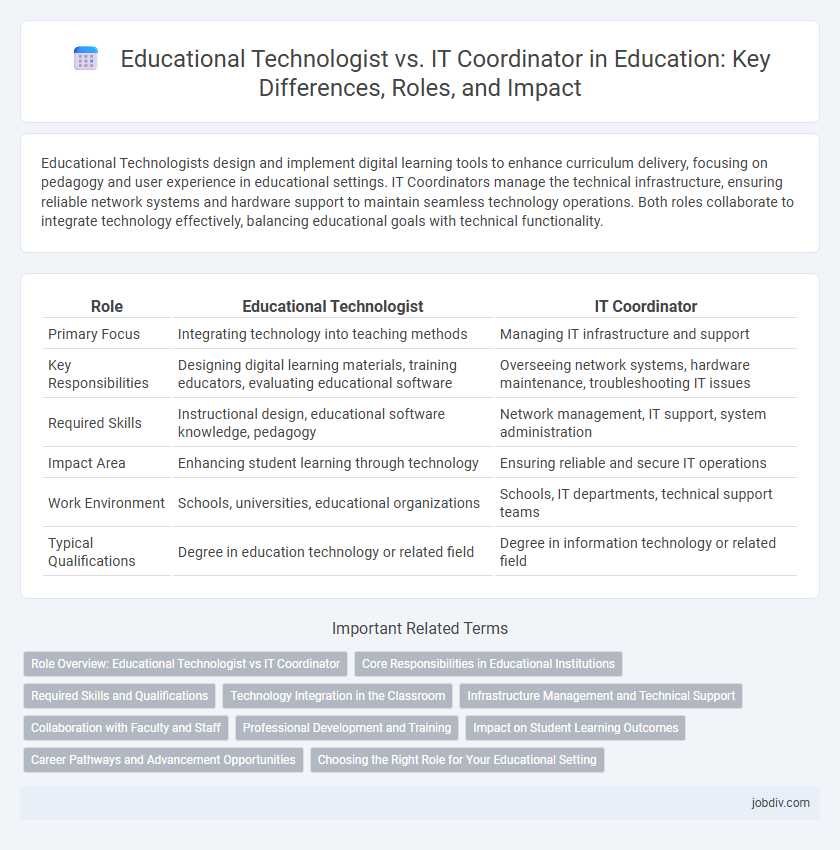Educational Technologists design and implement digital learning tools to enhance curriculum delivery, focusing on pedagogy and user experience in educational settings. IT Coordinators manage the technical infrastructure, ensuring reliable network systems and hardware support to maintain seamless technology operations. Both roles collaborate to integrate technology effectively, balancing educational goals with technical functionality.
Table of Comparison
| Role | Educational Technologist | IT Coordinator |
|---|---|---|
| Primary Focus | Integrating technology into teaching methods | Managing IT infrastructure and support |
| Key Responsibilities | Designing digital learning materials, training educators, evaluating educational software | Overseeing network systems, hardware maintenance, troubleshooting IT issues |
| Required Skills | Instructional design, educational software knowledge, pedagogy | Network management, IT support, system administration |
| Impact Area | Enhancing student learning through technology | Ensuring reliable and secure IT operations |
| Work Environment | Schools, universities, educational organizations | Schools, IT departments, technical support teams |
| Typical Qualifications | Degree in education technology or related field | Degree in information technology or related field |
Role Overview: Educational Technologist vs IT Coordinator
Educational Technologists specialize in integrating digital tools and instructional design to enhance teaching and learning experiences, focusing on curriculum development and pedagogy optimization. IT Coordinators manage the IT infrastructure and support services within educational institutions, ensuring hardware, software, and network systems operate efficiently for staff and students. While Educational Technologists drive innovation in learning technologies, IT Coordinators maintain technology reliability and user support.
Core Responsibilities in Educational Institutions
Educational Technologists specialize in integrating digital tools and instructional design to enhance teaching and learning processes, focusing on curriculum support and faculty training. IT Coordinators manage the technological infrastructure, ensuring network reliability, hardware maintenance, and user support within educational institutions. Both roles prioritize technology, yet the Educational Technologist centers on pedagogical enhancement while the IT Coordinator emphasizes operational IT management.
Required Skills and Qualifications
Educational Technologists require expertise in instructional design, learning theories, and educational software to develop effective technology-enhanced learning environments. IT Coordinators must possess strong technical skills in network management, hardware troubleshooting, and cybersecurity alongside project management capabilities. Both roles benefit from proficiency in communication and collaboration, but Educational Technologists emphasize pedagogical knowledge while IT Coordinators focus on infrastructure support.
Technology Integration in the Classroom
Educational Technologists specialize in designing and implementing instructional technology strategies that enhance student learning outcomes by integrating digital tools tailored to curriculum needs. IT Coordinators manage the technical infrastructure, ensuring reliable network access and device functionality to support seamless classroom technology use. The collaboration between these roles drives effective technology integration by aligning pedagogical goals with robust IT support systems.
Infrastructure Management and Technical Support
Educational Technologists specialize in integrating technology into curriculum design and instructional practices, emphasizing user-centered software and learning platform implementation. IT Coordinators focus on infrastructure management, overseeing network systems, hardware maintenance, and technical support to ensure seamless operation of educational technologies. Both roles collaborate to enhance digital learning environments, with IT Coordinators maintaining the technological backbone and Educational Technologists optimizing the instructional delivery.
Collaboration with Faculty and Staff
Educational Technologists specialize in integrating digital tools and instructional design to enhance teaching and learning, collaborating closely with faculty to develop effective educational materials and training. IT Coordinators focus on managing campus technology infrastructure, ensuring reliable network systems and technical support, and working alongside staff to maintain hardware and software essential for daily operations. Both roles require strong teamwork skills, but Educational Technologists emphasize pedagogical collaboration, while IT Coordinators prioritize technical collaboration with faculty and staff.
Professional Development and Training
Educational Technologists design and implement technology-driven training programs tailored to enhance teaching strategies and student learning outcomes. IT Coordinators manage the technical infrastructure while providing foundational training to staff on hardware and software use. Both roles contribute to professional development, with Educational Technologists focusing on pedagogical innovation and IT Coordinators ensuring operational technology proficiency.
Impact on Student Learning Outcomes
Educational technologists enhance student learning outcomes by integrating innovative digital tools and personalized learning strategies that promote engagement and deeper understanding. IT coordinators ensure the seamless operation of technology infrastructure, minimizing disruptions and maintaining reliable access to educational resources. Together, their roles complement each other, with technologists driving pedagogical innovation and IT coordinators providing critical technical support.
Career Pathways and Advancement Opportunities
Educational Technologists specialize in integrating digital tools and instructional design to enhance learning experiences, often advancing into roles such as Curriculum Developer or Learning Experience Designer. IT Coordinators manage the infrastructure and support for educational technology, with career progression leading toward IT Manager or Director of Technology positions within academic institutions. Both pathways offer advancement opportunities, yet Educational Technologists typically focus on pedagogical innovation, while IT Coordinators emphasize technical systems management.
Choosing the Right Role for Your Educational Setting
Educational Technologists specialize in integrating digital tools and instructional design to enhance learning experiences, focusing on curriculum development and technology training for educators. IT Coordinators manage the technical infrastructure, including network maintenance, hardware support, and software deployment, ensuring seamless operation of educational technology systems. Selecting the appropriate role depends on the institution's priority: advancing pedagogical innovation or maintaining technological stability and support.
Educational Technologist vs IT Coordinator Infographic

 jobdiv.com
jobdiv.com